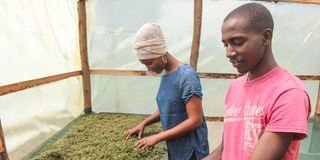Spiced-up business for youth growing herbs

George Gathuru and Augusta Muthoni dry herbs at their enterprise in Kagaa, Kiambu County. They are members of Helitech, a group which consists of 12 youths, growing herbs and adding value to the produce.
What you need to know:
- In the project, the youths take different roles; some planting, others engaging in sun-drying, milling, packaging, marketing and distribution of their produce to the market.
- From one acre, one can harvest between 600 and 1,000 kilos of fresh herbs.
- Members of the group turned to value addition to expand their market.
- They market their products to hotels, restaurants and residential homes in Nairobi, Kiambu, Machakos , Nyandarua and Nakuru.
Some 10km from Githunguri town in Lari, Kiambu County, you will find a quiet village named Kagaa, where subsistence farming is the mainstay.
It is here that Healthy Living Tech (Helitech), which comprises a group of 12 youths led by George Gathuru, 22, and Augusta Muthoni, 28, farm herbs on a quarter-acre and add value to the nutritious crops before selling.
In the project, the youths take different roles; some planting, others engaging in sun-drying, milling, packaging, marketing and distribution of their produce to the market.
“We began the project in 2012 as a kitchen garden to keep ourselves busy by growing sukuma wiki (collard greens) and maximise the use of the small space one of our members donated,” says Gathuru, a food production student at the Jomo Kenyatta University of Agriculture and Technology.
They later went into farming herbs in 2015 and are currently growing thyme, black mint, hibiscus and sweet oregano, among others.
“We did not require any capital to purchase seedlings since some of the crops are readily available in the area, growing as flowers or weeds,” says Augusta.
However, they contributed Sh10,000, which they used to buy additional herb seedlings they could not get in the region.
So, why herbs?
“They are not attacked by pests and their market is growing. All that is needed after planting them is top-dressing using fine rabbit and goat manure, then you water the plants and in a span of three months, they are ready for harvesting,” she offers.
Value addition skills
Further, the crops are also very productive, the duo note. From one acre, one can harvest between 600 and 1,000 kilos of fresh herbs.
“A bed of one-by-10 metres of thyme gives us not less than three kilos, with each going for between Sh150 and Sh200.”
The group moved into worm rearing to provide quality organic fertiliser. “We use the organic fertiliser on our crops. We invested some Sh70,000 in the project where we nurture worms and use their juice and sell the surplus. The organic fertiliser depends on what you feed the worms on. If you give them collard greens, the fertiliser will be rich in calcium,” says Gathuru.
Members of the group turned to value addition to expand their market.
“We set up the solar dryer measuring six by three metres ourselves using wood and polythene paper. It has six trays, which host between 80-120 kilos of fresh produce that take three days to dry. We then mill and pack for selling,” says Gathuru. When herbs are dried, prices rise. For instance, a kilo of dried thyme goes for Sh5,000 while dandelion Sh10,000.
They learnt value addition skills at JKUAT’s Development Centre Unit, where food production lessons are offered. “Farmers go to learn different techniques of adding value to fruits, vegetables, animal products and herbs."
They market their products to hotels, restaurants and residential homes in Nairobi, Kiambu, Machakos , Nyandarua and Nakuru.
Gathuru says it takes time before the farmer starts to enjoy the fruits of his labour. “We have learnt to be patient and passionate as it took more than one year to put something reasonable in our pocket,” he adds.
George Muturi, a vermiculture specialist who works in conjunction with Egerton University, says adding value to herbs increases one’s earnings.
One thing that will make herbs thrive on your farm is organic fertiliser and pesticides. If a farmer lives in cold areas, he might need to invest in a greenhouse.
A farmer should also consult with an expert especially for small-scale farmers doing strictly organic farming.





